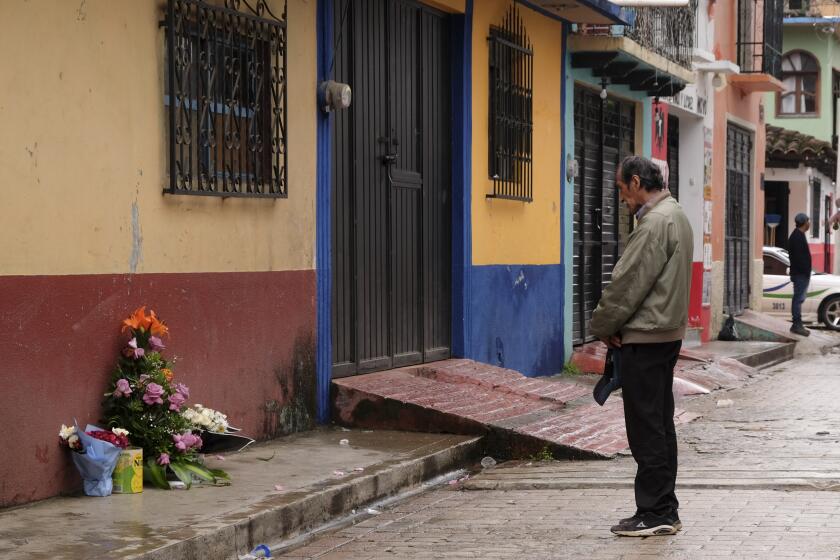What Robert Durst said he meant when he told lawyers: ‘I kill a lot’
Reporting from Houston — “Did you tell Tim Wilson that you, quote, ‘kill a lot’?” the lawyer asked.
“Did I tell Tim Wilson what?” Robert Durst replied.
The lawyer repeated the question.
“I kill a lot?” Durst said. Then he chuckled, repeating: “I kill a lot.”
It was January 2016, nearly a year after Durst was arrested in New Orleans on weapons charges and a Los Angeles County warrant for the murder of his friend in 2000.
The eccentric real estate heir and subject of the HBO documentary “The Jinx” was still being held in a Louisiana prison. Lawyers had come to take his deposition in a civil dispute with Wilson, a private investigator who had worked on his defense team in a different murder case.
Durst, 73, had wanted the three-hour video of the deposition to remain confidential. But last month, a judge ruled that it was not.
This week, Geoffrey Berg, the lawyer who questioned Durst, allowed a reporter for The Times to watch it in his Houston office.
RELATED: Letter to a Times reporter from Robert Durst
Durst wore an orange jumpsuit that hung on his narrow frame, and his eyes darted to attorneys who flanked him at Nelson Coleman Correctional Center in Killona, La., about 35 miles west of New Orleans. He appeared alternately annoyed, amused and bored. He burped and yawned. His voice sounded raspy, even as he sipped and swished water from a Styrofoam cup.
One of his lawyers, Dick DeGuerin, noted that Durst suffered from chronic obstructive pulmonary disease, “so he is short of breath frequently; he tires easily.”
“I’m deaf in my left ear, so you kind of have to shout a little bit,” Durst told his questioner.
He frequently invoked his 5th Amendment right against self-incrimination, repeating, “I respectfully decline to answer your question.”
At times, he appeared disoriented. “Where am I at?” he asked his attorney. “What am I doing?”
After Durst told the lawyers, “I kill a lot,” his questioner pressed him.
“Did you say to Tim Wilson, ‘I kill a lot and I’m good at it’?”
“When you said to Tim Wilson ‘I kill a lot and I’m good at it,’ you were referring to Susan Berman?”
“When you said that you, quote, ‘kill a lot’ to Tim Wilson, did you mean that you had killed Kathy Durst?”
After each question, Durst pleaded the 5th.
In a note Durst added to the deposition, he explained that when he said “I kill a lot,” he was “repeating what I believed the attorney’s question to me to be in question form, to confirm that I heard it correctly and understood it.”
RELATED: New letter from Robert Durst talks of football, opera, but not murder
DeGuerin said in an interview Tuesday that “it was a ridiculous question and he was astonished by it.”
Durst’s statement echoed the pivotal scene in “The Jinx,” the 2015 six-part series that explored the mysterious disappearance of Durst’s first wife in 1982, the killing of his neighbor in Galveston, Texas, and the slaying of his friend, Susan Berman, who was shot to death in her Benedict Canyon home.
“What the hell did I do? Killed them all, of course,” Durst muttered in the final episode while he was off-camera but still wearing a microphone.
The documentary maker, Andrew Jarecki, had been in contact with Los Angeles police and prosecutors, who moved against Durst while the series was still airing.
In March of 2015, the day before the final episode, Durst was arrested at a hotel in New Orleans. After pleading guilty to the federal weapons charges, he was moved to Los Angeles to stand trial in the killing of Berman.
The next hearing in the case is scheduled for Feb. 14 in Los Angeles Superior Court, where lawyers are expected to question two witnesses for the prosecution.
It is the second time Durst has faced murder charges. He was tried in the death of his Galveston neighbor, Morris Black, and acquitted in 2003 despite admitting that he had cut up Black’s body and dumped the parts into Galveston Bay.
Durst’s health has often been an issue in his court proceedings. He recently appeared in court in a wheelchair, wearing a neck brace. In New Orleans, prosecutors argued that he suffered from an “acute mental health condition” that required him to be housed in a special unit in prison. Durst’s attorneys described him in court papers as “frail” but disputed claims of any serious mental condition.
In a jailhouse interview after his most recent arrest, Durst told prosecutors that he was high on methamphetamines during filming of “The Jinx,” according to court papers released last month.
The newly available deposition did little to clarify why Durst had agreed to participate in the documentary.
“Was it important to you that your side of the story be told?” his questioner asked.
Durst pleaded the 5th.
“Do you know who Andrew Jarecki is?”
“Yes, I do,” Durst said, looking stern. “I wish I didn’t.”
Twitter: @mollyhf
ALSO
HBO’s ‘The Jinx’ played key role in ‘urgent’ timing of Robert Durst’s arrest, prosecutors say
More to Read
Sign up for Essential California
The most important California stories and recommendations in your inbox every morning.
You may occasionally receive promotional content from the Los Angeles Times.











